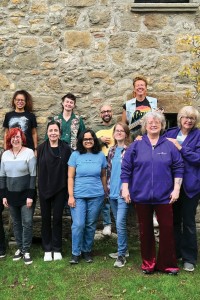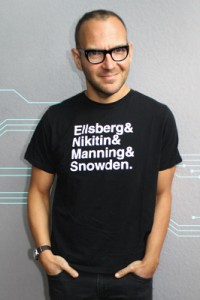Spotlight on: We Need Diverse Books

Tell us about the mission of We Need Diverse Books.
We Need Diverse Books, AKA WNDB, is a non-profit, grassroots organization of children’s book lovers that advocates for essential changes in the publishing industry. Our aim is to create a world in which every child can see themselves in the pages of a book.
Fill us in on the organization’s history: when was it founded, and by whom? What achievements are you most proud of?
In a Twitter exchange on April 17, 2014, Ellen Oh and Malinda Lo expressed their frustration with the lack of diversity in kidlit. This wasn’t a new conversation for Ellen or Malinda, just the latest, this time in response to the all-white, all-male panel of children’s authors assembled for BookCon’s May 31 reader event. In a series of tweets, Ellen started talking about taking action. Several other authors, bloggers, and industry folks piped up, saying they would like to be involved as well.
A small group of volunteers planned a three-day event for May 1-3 to raise awareness, brainstorm solutions, and take action (Diversify Your Shelves). Aisha Saeed primed the pump on April 24 with the first tweet to include the #WeNeedDiverseBooks hashtag. After Aisha’s post, the hashtag started taking off, officially trending for the first time on April 29, around 9:30 p.m. EST. More than 20,000 people responded, submitting their personal testimonials.
Following the campaign, WNDB was started by a team of writers, illustrators, and publishing professionals, led by the original Executive Committee (Ellen Oh, Lamar Giles, Marieke Nijkamp, Miranda Paul, Aisha Saeed, Karen Sandler, and Ilene Wong) and supported by the original PR team (Stacey Lee and SE Sinkhorn). WNDB was founded as a non-profit in 2014 with the support of the kidlit community.
What resources do you offer?
WNDB offers a range of dynamic initiatives for writers, illustrators, educators, librarians, publishing professionals, and anyone looking for the next great children’s book. WNDB programming has accomplished the following:
- WNDB in the Classroom has donated over 19,000 children’s books to public schools in 48 states and the District of Columbia.
- The Penguin Random House Creative Writing Award, in partnership with WNDB, has awarded ten scholarships of $10,000 to graduating seniors across the country.
- The Internship Grant program has given 54 internship grants to interns working at publishing houses and literary agencies. Thirty of them continue to work in the industry.
- The Mentorship program has mentored 49 emerging authors and illustrators, among them Angeline Boulley, Lisa Brathwaite, and A.M. Dassu.
- Inaugurated in 2016, the Walter Dean Myers Awards have celebrated 24 titles by children’s and young-adult authors. The 2020 Walter winners are Laura Dean Keeps Breaking Up with Me by Mariko Tamaki and illustrated by Rosemary Valero-O’Connell and The Bridge Home by Padma Venkatraman.
- The Walter Dean Myers Grant has provided financial support to 16 aspiring creators from marginalized communities. Past honorees include Angie Thomas, Francesca Padilla, and Jennifer De Leon.
WNDB is also known for its middle-grade and young-adult anthologies published in collaboration with Penguin Random House, and OurStory, an online diverse book directory, which features thousand of books curated by volunteer librarians and educators.
What challenges does We Need Diverse Books face today? Are there any issues due to the pandemic’s impact on publishing?
Publishing, like most other industries, has been impacted by the pandemic in ways that we don’t fully see. We know that the pandemic has had a disproportionate impact on marginalized creators and publishing professionals, many of whom are also a part of groups being hit harder by the pandemic, such as Indigenous people, people of color, and disabled people. In an effort to address this need, WNDB created the Emergency Fund for Diverse Creatives in Children’s Publishing, granting traditionally published authors, illustrators, and publishing professionals the opportunity to receive small grants to help meet short-term financial obstacles. The Emergency Fund is well resourced and open for applications.
The pandemic has simultaneously seen some positive temporary changes to publishing, including the opportunity to work and intern remotely, which makes working in publishing more widely accessible, and the rise of virtual events, which, when planned well, can be accessible, safe ways for more people to meet and hear from their favorite authors. We hope that these changes will have a ripple effect on the industry after the pandemic is over and that the kidlit community will continue to ensure that virtual events are accessible and safe, so that more people have the opportunity to engage with books and authors without the cost of traveling to expensive and often physically inaccessible conferences and events.
Who are the members of the executive committee, and what made them want to get involved?
Ellen Oh (CEO and President), Dhonielle Clayton (COO), and Judy Schricker (CFO). Ellen Oh and Dhonielle Clayton are both kidlit authors themselves; they know firsthand the barriers that authors of color face to getting their books published and promoted, and they know that other marginalized authors experience similar challenges. They wanted to change the industry, remove those barriers, and create a better path forward. Ellen recognized the support that the kidlit community shared for the #WeNeedDiverseBooks hashtag and wanted to turn it into a larger movement for change that could leave a lasting impression on the children’s publishing industry. Judy Schricker has a background in corporate finance and accounting and immigrated to the United States with her parents and sister as a young child. She wanted to be part of WNDB for her two teen boys and all the other young people who might have a hard time finding themselves in the books they read.
How can interested readers help with your organization?
Interested readers can make a financial donation, volunteer their time, and use their voices to spread the word about our work, and the importance of diversity in publishing. A virtual trip to our website, <diversebooks.org>, will introduce readers to ways to connect with us and available resources, special announcements, and industry news.
If they work in publishing, library services, or education, they can advocate for the inclusion of diverse books at their school, workplace, and community. Their voice can ensure that literature and texts featuring diverse characters are reflected in curricula and available for free in public libraries. For some children and teens, public schools and libraries may be the only opportunity for them to find a book that affirms their identity or helps them to understand someone else’s reality. Lastly, they can speak up if they attend an event featuring an all-white panel, request ASL interpreters and other accommodations be available at events, and suggest that everyone share their pronouns at the beginning of a meeting.
This and more like it in the November 2020 issue of Locus.
 While you are here, please take a moment to support Locus with a one-time or recurring donation. We rely on reader donations to keep the magazine and site going, and would like to keep the site paywall free, but WE NEED YOUR FINANCIAL SUPPORT to continue quality coverage of the science fiction and fantasy field.
While you are here, please take a moment to support Locus with a one-time or recurring donation. We rely on reader donations to keep the magazine and site going, and would like to keep the site paywall free, but WE NEED YOUR FINANCIAL SUPPORT to continue quality coverage of the science fiction and fantasy field.
©Locus Magazine. Copyrighted material may not be republished without permission of LSFF.







